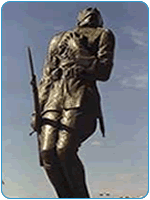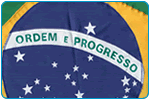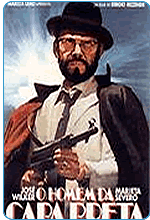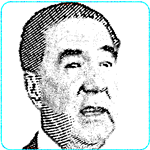 Brazilian Democracy, Communism, and Mandatory Voting
Brazilian Democracy, Communism, and Mandatory Voting
Case Study: Brazilian Stock Market
Brazilian Democracy Under Stress
The Long Battle against Communism
The generals did not seek glory, permanent position, or riches for themselves.
The military leaders who pushed João Goulart from power in 1964 had honorable intentions, consistent with Brazilian traditions and symbolized by the statue of a dying lieutenant, one of eighteen "tenentes", who had marched on Copacabana Fort in 1922 in the desire to bring modernization and progress to Brazil by facing down corrupt politicians who usurped democracy.
 The "18 do Forte" Statue in Copacabana symbolizing soldiers dying for modernization of Brazil and the fight against corrupt politicians.
The "18 do Forte" Statue in Copacabana symbolizing soldiers dying for modernization of Brazil and the fight against corrupt politicians.The generals also had good reason to consider communists as other than innocent voices in the democratic process.
In the 1920s, financed by the Soviet Union, the communist leader, Luís Carlos Prestes (1898-1990) had set up 1,600 branches of the communist-front ANL party.
Trained as a military officer, Prestes had led a armed revolt in 1924 and had lived in Moscow, at the invitation of the Soviets, from 1931 to 1934.
In 1935, communist militants connected to Prestes murdered senior officials in their beds in Natal and Recife, before being defeated in armed combat when they marched on Rio de Janeiro.
Arrested and convicted after the failed bloody communist coup of 1935, Prestes was sent to jail.
By the 1960s, he was again free to stir up trouble.
Luís Carlos Prestes was forced into exile by the Revolution of 1964, but was granted amnesty by General Figueiredo in 1979, as part of the process of "redemocratization".
Postponing Democracy
Not only the military, but large segments of Brazil's educated and most productive classes had misgivings about democracy in Brazil.
 Is democracy consistent with 'order and progress'?
Is democracy consistent with 'order and progress'?Many thought that popular democracy might be inconsistent with the motto on the Brazilian flag: Ordem e Progresso.
This motto was inspired by the French philosopher Auguste Comte, the founder of 'Positivism'.
John Stuart Mill had this to say about Comte:
"M. Comte, in particular, whose social system, as unfolded in his Systeme de Politique Positive, aims at establishing (though by moral more than by legal appliances) a despotism of society over the individual, surpassing anything contemplated in the political ideal of the most rigid disciplinarian among the ancient philosophers." (On Liberty.)
When uneducated masses seemed to be easily duped by politicians intent on stealing rather than providing public service, many people had reason to question whether the abstract concept of 'democracy' was worth the cost in misery, poverty, and crime.
The conflict between democratic representation and the ideal of 'order and progress' had been a theme of Brazilian politics since the founding of the Republic.
[See Gilberto Freye's "Order and Progress", a classic social history on this topic.]
The first two presidents of Brazil were generals, as were four more in the first half of the 20th century. There was also the dictatorship of Getúlio Vargas in the 1930s and 1940s.
In the longer view, the idea of authoritarian rule was deeply rooted in Brazilian culture. Until 1889 Brazil was an Empire, ruled by an Emperor. The Empire fell, not because of popular revolt, but because plantation owners were incensed when Princess Isabel signed a decree abolishing slavery.
Throughout the 20th century , the military and the productive classes insisted on 'order and progress' while venal civilian politicians and leftists preached 'democracy'.
Mandatory Voting
In the 1960s, Brazilian law forced almost everyone to vote. Citizens were required to carry a 'voting card' proving they had voted in the last election.
 In 1958, Brazilians elected a rhinoceros to the Senate by 100,000 votes
In 1958, Brazilians elected a rhinoceros to the Senate by 100,000 votesEveryone from 18 to 65 that could sign their name was obliged to go to the polls on election day and stand in long lines.
Voting was optional only for those from 16 to 17 and over 65.
Furthermore, failure to vote could have consequences, since a voting card was often inspected by the government every time a citizen had official business to transact.
Because of long lines and the element of coercion, many resented the democratic process.
Voting "em branco" (in blank), voting for those who made absurd promises, and nonsensical write-in voting was common.
A famous cases of such a protest vote was the election of Cacareco, a rhinoceros at the São Paulo zoo, to the Senate with 100,000 votes, in 1958.
Another glaring example of flaws in Brazilian democracy was Tenório Cavalcanti, 'O Homem da Capa Preta', one of the most influential politicians in the backlands of Rio de Janeiro during the 1950s and 1960s, whose life was made into a movie in 1986.
 Democracy Brazilian style: Tenório Cavalcanti and "Lurdinha" (movie poster)
Democracy Brazilian style: Tenório Cavalcanti and "Lurdinha" (movie poster)Tenório was famous for appearing in the legislative halls with a machine gun that he called 'Lurdinha', along with a black cape and beard.
(One manufacturer, quick to recognize a commercial opportunity, used a silhouette of a man with cape and machine gun as a trade mark for rat poison, with the slogan, 'Mata Tudo!')
Tenório Cavalcanti (1907-1987) lived by violence, but from behind his fortress in the 'Baixada Fluminense' he was the face of democracy to the local citizenry.
Unashamed corruption was another hallmark of Brazilian politics when civilians were in office.
Ademar de Barros (1901-1969), Governor of Sao Paulo and founder of the important Partido Social Progressista, was famous for saying, 'Rouba, mas faz', which means 'Steal, but get things done!'.
After the Revolution of 1964, he was barred from office for ten years by President Castelo Branco, because of his record of corrupt dealing.
 Ademar de Barros saw nothing wrong with politicians stealing, as long as they got something done.
Ademar de Barros saw nothing wrong with politicians stealing, as long as they got something done.Another peculiarity of Brazilian democracy was the rule that allowed every candidate for public office to have free television time during a campaign.
Since there were over two dozen political parties and hundreds of candidates, the result of this law was that most people turned off their television sets for several hours each evening during the political season.
After the return of 'civilian rule' in the 1980s , John Kenneth Galbraith, the Harvard professor, apparently just learning of the free TV time provision, wrote a piece in the Wall Street Journal praising the practice as a victory of the 'return of democracy', unaware that this annoying rule was also observed during the years of military 'dictatorship'.
The most fervent advocates of democracy had always been the corrupt civilian politicians and the radical left who saw 'democracy' as the way to power, confident in their ability to hoodwink the ignorant masses.
In any event, there had long been a deep cynicism regarding the efficiency of the democratic process in Brazil.
In 1964, it was clear that unbridled 'democracy' was simply not working and that João Goulart was standing in the way of 'Ordem e Progresso'.

